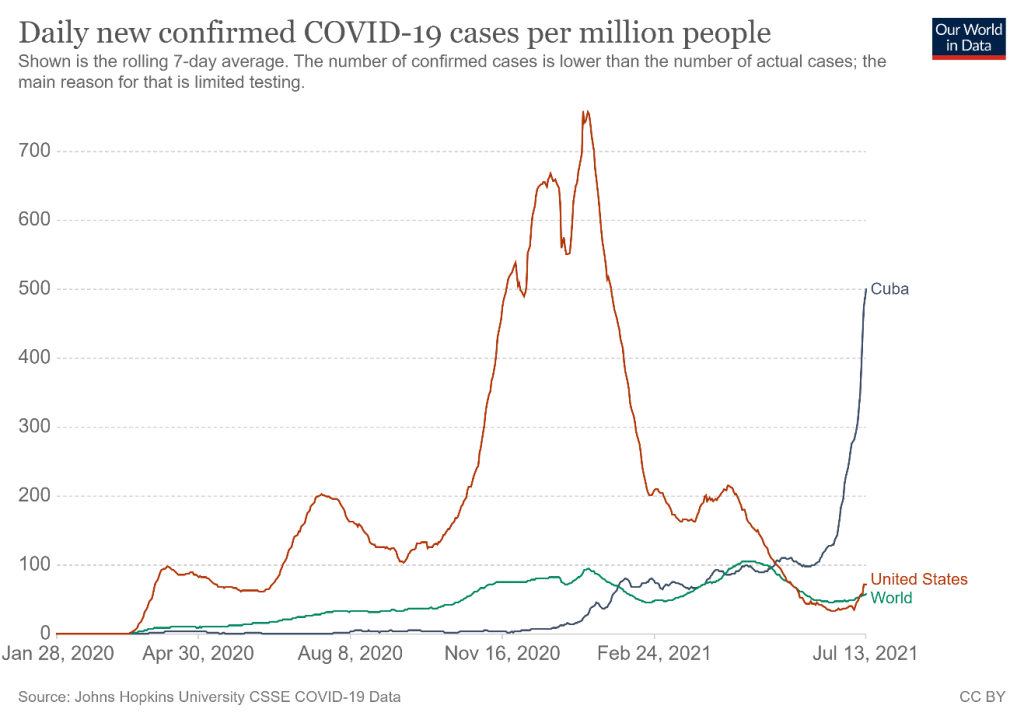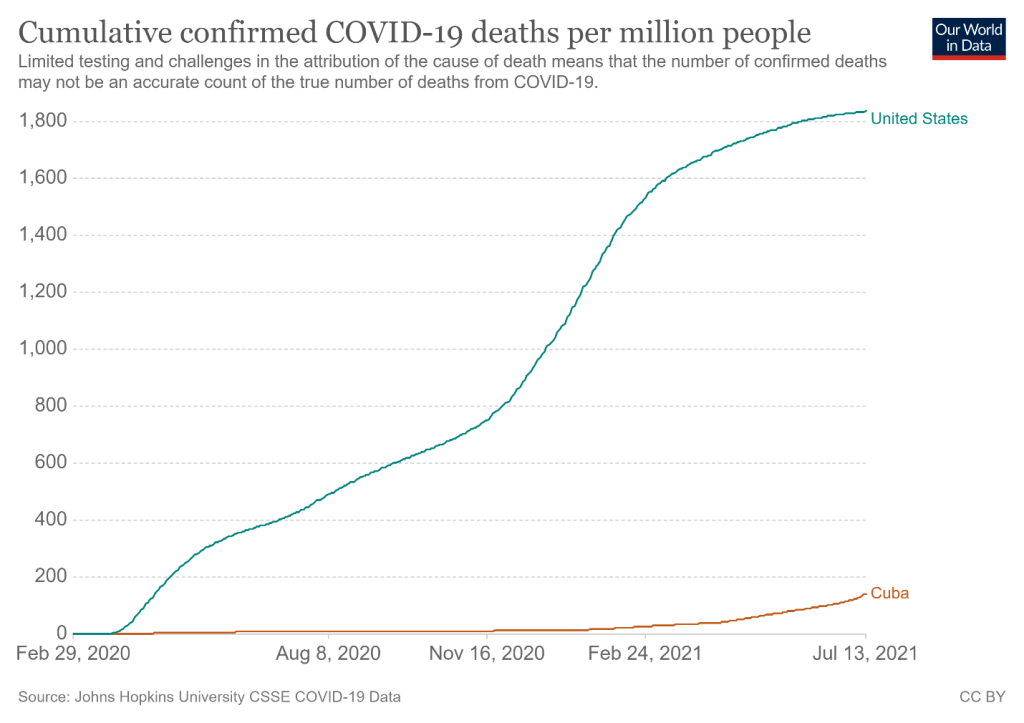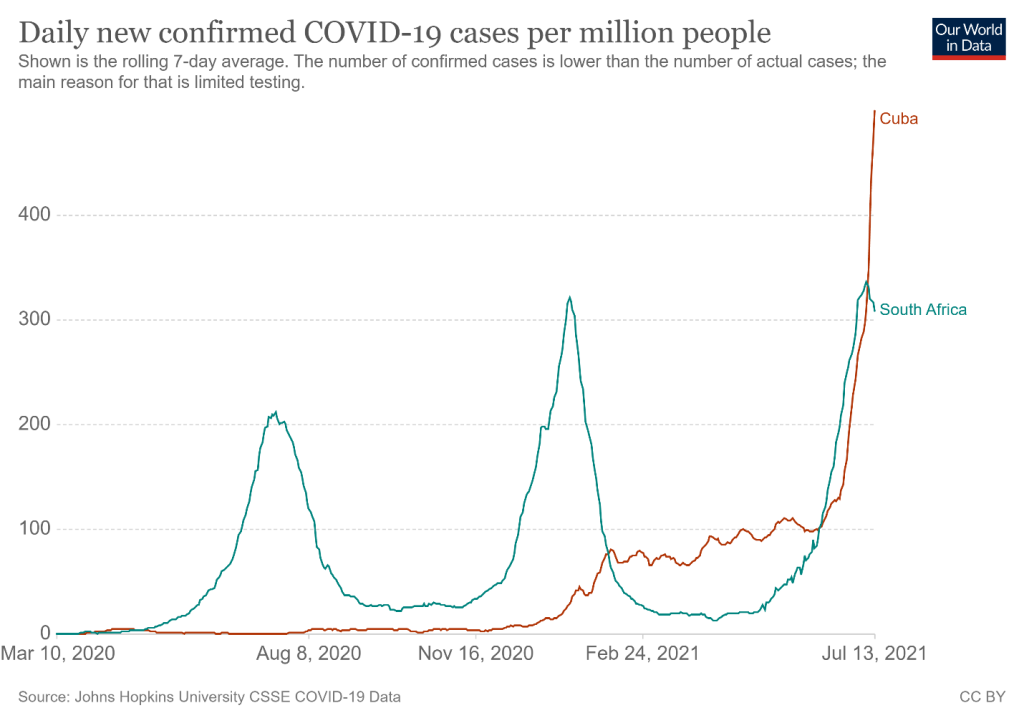July 14, 2021
Stephen Gowans
What follows is based on my reading of Cuban president Miguel Diaz-Canel Bermudez’s analysis of the causes of the recent protests in Cuba, plus data from Our World in Data, showing a sharp rise in Covid-19 cases on the island since June 22.
Cubans are facing shortages of critical goods. This is happening at a time Covid-19 cases are sharply climbing.

The pandemic has severely reduced Cuba’s access to its main sources of foreign currency:
- Tourism
- Visits of expatriate Cubans
The reduction in foreign currency has restricted Cuba’s ability to buy foreign goods:
- Food
- Drugs
- Raw materials
- Spare parts
At the same time, fuel imports have been reduced.
Only about 20 percent of the population has been vaccinated. The low level of vaccination is attributable to two factors:
- Cuba had to develop its own vaccines because it couldn’t afford to buy them from foreign suppliers, most of whom wouldn’t sell them to Cuba anyway.
- Cuba doesn’t have the capability of producing doses in sufficient quantity to vaccinate the whole population at once. Vaccinating everyone will take time.
To Cuba’s existing economic difficulties, created by Washington’s ongoing attempts to strangle the country economically, are added these new pandemic-related problems. As a consequence, dissatisfaction has increased.
To exploit the growing difficulties, Washington is running a vigorous campaign to portray:
- The Cuban government as the inept architect of Cubans’ growing misery, and
- The US as a solicitous neighbor keen to rescue Cubans from the incompetence of their government.
While Washington professes solicitude about the health of Cubans, it presides over its own system of private health care which privileges the rich at the expense of the poor. Its concern for the welfare of Cubans [to say nothing of its concern for the welfare of its own citizens] is insincere. [Plus, Washington has shown gross incompetence in protecting the health of its own citizens against the dangers of Covid-19, posting cumulative deaths per million over 13 times greater than Cuba.]

Some Cubans who are committed to the revolution, but are dissatisfied by the critical goods shortages, participated in the protests. The government is willing to discuss potential solutions with them, so long as they recognize and understand the real causes of the problems Cuba faces.
I’ll add the following to the Cuban president’s analysis.
South Africa offers a similar concurrent case of a political distemper precipitated by pressures produced by a worsening pandemic.
The pandemic has had two main effects in both countries:
- Increased misery on top of already existing misery. (High unemployment and inequality in South Africa and US-sanctions-created privations in Cuba.)
- A growing health hazard.

There are, however, important differences between the two countries.
- South Africa’s political distemper is more severe, marked by rioting and looting.
- South Africa has not been under a six-decades-long blockade (although its long-running regime of neo-liberal economics has probably had comparable effects for all but privileged South Africans.)
- Washington isn’t trying to take advantage of the miseries produced by the pandemic to destabilize Pretoria.
Despite these differences, protests in Cuba and South Africa, and political upheavals in Colombia, Brazil, and Peru, are traceable, in part, to the destabilizing force of the pandemic.
The failure of governments of the right to manage the economic pressures and public health hazards of the pandemic will provide political opportunities for parties of the left to mobilize those whose circumstances have worsened, so long as they offer credible solutions to pandemic-induced problems.
At the same time, the pandemic’s inherent power to destabilize will add to existing US efforts to disrupt and weaken governments that refuse to be brought under US control and influence. (This opportunity, however, is absent in the cases of China and Vietnam, both of which have exhibited peerless competence in managing the public health and economic effects of the pandemic.)